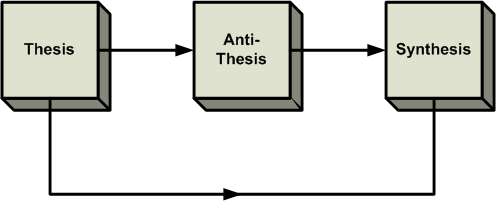Synthesis
Georg Hegel (1770-1831) was an 18th century German philosopher whose writings are notoriously obscure. He discussed the development of an “absolute idea” or “universal truth” that is obtained by reconciling contradictions and tensions within systems. This way of thinking is frequently referred to as an ‘Hegelian Synthesis’, even though he himself never actually used the term. The basic idea can be summarized in the following three steps.
-
We start with an initial idea or situation. This starting point is referred to as the ‘Thesis’.
-
Next, we have a reaction or negation of the Thesis. It is called the ‘Antithesis’.
-
A ‘Synthesis’ develops — it has its roots in both the Thesis and the Antithesis, but it is not the same as either.
The concept is illustrated in the following sketch.

The Synthesis can itself become a new Thesis which can generate a new Antithesis, thus leading to a new and better Synthesis, and so on.
Thesis
In the context of the climate crisis, the Thesis is our current way of living. It started with the industrial revolution 300 years ago. If we have to pick a date let us select the year 1712. It was in that year that Thomas Newcomen — a Baptist preacher — invented his ‘atmospheric engine’ for pumping water from the Cornish tin mines. His engine was powered by steam generated from the burning of coal. It was the start of a 300-year party fueled by the abundant energy provided by coal, oil and natural gas.
The party, the way we live now, has been a time of extraordinary material abundance. It has been a unique time in human history, and it is coming to an end. Our supplies of fossil fuels and many other resources are finite and are being irreversibly depleted. In addition, our use of the fossil fuels has created a host of environmental problems, including climate change.
Antithesis
The Thesis is followed by an Antithesis — in this case the manner in which society organizes in reaction to material abundance based on the easy availability of fossil fuels and other finite resources. Many factors comprise the Antithesis; not just climate change and resource depletion, but also population overshoot, the financialization of the economy (in which finance has become increasingly detached from the goods and services that money provides), acidification of the oceans and destruction of the biosphere.
When did the Antithesis commence? For many people, the life of seemingly eternal material progress ended sometime in the 1970s. It was during that decade that living standards reached a plateau and have not increased since. However, if we have to select a specific date, the year 2018 is a sensible choice. The U.S. Energy Information Agency tells us that world oil production peaked in that year at about 83 million barrels a day (this figure includes all types of oil: conventional, deep water, tar sands and tight oil). It is unlikely that production in future years will ever exceed that value, hence the year 2018 becomes the year of ‘Peak Oil’. (The term ‘Peak Oil’ does not mean that we run out of oil. It means that oil is being used at a faster rate than new sources are being discovered.)
Because oil is so utterly fundamental to all aspects of modern life, the year that it starts to decline can be seen as being the end of the ‘Thesis’ and the start of the ‘Antithesis’. In the words of Alice Friedemann,
Of all the resources in the world, oil is top dog. All other resources depend on oil. You can get every fish in the sea, drain every drop out of non-renewable aquifers, make enough concrete to pave the planet, and convert every square mile of land to grow crops and feed barnyard animals cutting down the remaining forests. Which we are well on our way to doing. But only oil can do it, because the heavy-duty diesel engines that do the essential work of civilization run on diesel fuel. Locomotives, ships and trucks . . . all burn oil.
One of the realities to do with our predicament is that no alternative energy source has the unique features of oil and, to a lesser extent, the other fossil fuels. Oil is energy dense, portable, safe and available as needed. No other energy source matches it. And no other energy source provides the hydrocarbon molecules that provide the basis of our modern way of life: the fertilizers, plastics, anaesthetics and thousands of other essential products are all derived from crude oil and the other fossil fuels.
Some people see the Antithesis as being a time of collapse, destruction and general all-around unpleasantness — an attitude summarized by the splendid abbreviation, TEOTWAWKI (The End of the World as We Know It). Maybe these people are correct. But the truth is that no one really knows what the future holds. At best we can see no more than an outline of where we are going. All that we can say with confidence is that the future will be drastically different from the past.
Because we are in the early days of the Antithesis, most people do not recognize that their world is changing in such a fundamental manner. These people may agree that the climate is changing, but they perceive it as being just one problem among many. In spite of the fact that wildfires, droughts, storms and hurricanes are all increasing in intensity and frequency, most people go about their lives in the normal way. They may worry about rising fuel prices, but they do not recognize that a permanent decline in oil supplies must lead to profound changes in the manner in which they live.
Having said which, it is probably true to say that conditions have already changed so much that many people are intuitively aware that material conditions are deteriorating, and that things are “not right”. They can relate to the words of the second witch in Shakespeare’s Macbeth,
By the pricking of my thumbs,
Something wicked this way comes.
Synthesis
Out of the ‘Thesis’ and ‘Antithesis’ comes the Synthesis. We do not know what form the Synthesis will take. All that we can be sure of is that it will not be a duplicate of the past. The events of the Antithesis are irreversible; there is no return, at least, not on a human time scale. In other words, we face predicaments, not problems.
Problems have solutions, predicaments do not. When faced with a predicament we can respond and adapt, but we cannot make it go away.
It seems certain that our material standard of living will decline as the Antithesis develops. We may even face some form of collapse. But there may also be pleasant surprises — we may discover new ways of living that are more in harmony with the natural world. Serendipity happens. This lack of certainty as to what the future may hold forms the basis of what is written in this book.
The fact that we are not certain as to what the future holds does not mean that we just give up. It is our responsibility to develop a view of the future that fits current circumstances, to develop a plan in response, and then to act on that plan.
The response can take many forms: political, individual, business, industrial, community-oriented and spiritual. All have their place, and all are needed; indeed, it is likely that an individual person will work in different areas at different times. The material in this book concentrates on just two aspects of a potential Synthesis: Technology and Industry. These two items do not operate in isolation — all the responses affect one another in a myriad of ways.
It is crucial to recognize that technology will not provide us with a deus ex machina defined as,
a plot device whereby a seemingly unsolvable problem in a story is suddenly and abruptly resolved by an unexpected and unlikely occurrence.
In other words, there is no magic wand that we can wave which will provide us with an abundant supply of clean energy. Indeed, technical solutions themselves all require an investment of fossil fuel energy.
